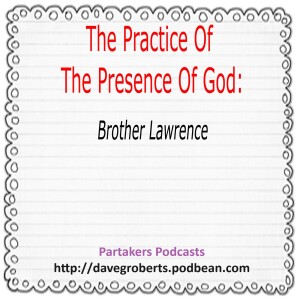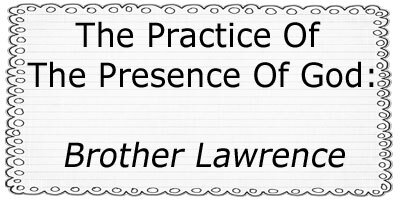
G’day and welcome to Partakers Christian Podcasts! Join us for uplifting Bible teaching, inspiring readings, heartfelt worship, powerful prayers, and fascinating church history. Whether you’re new to faith or growing deeper in your journey, we’re here to encourage and equip you. 🎧 Tune in, interact, and be inspired—wherever you are in the world.
Episodes

Saturday Jun 15, 2024
The Practice Of The Presence Of God - Brother Lawrence Part 2
Saturday Jun 15, 2024
Saturday Jun 15, 2024

The Practice Of The Presence Of God:
The Best Rule Of A Holy Life
G’day! Welcome to Partakers! Today we continue our Sunday series, where we are reading from a book by Brother Lawrence “The Practice of the Presence of God”… This book is available for you to freely download at various websites!
Love is to be the motive of all. Once in fear, now in joy. Diligence and love. Simplicity the key to Divine assistance. Business abroad as at home. Times of prayer and self-mortification not essential for the practice. All scruples brought to God. (The audio continues the conversation...)
Right Mouse click or tap here to save this as an audio mp3 file

Friday Jun 14, 2024
The Practice Of The Presence Of God - Brother Lawrence Part 1
Friday Jun 14, 2024
Friday Jun 14, 2024

The Practice Of The Presence Of God:
The Best Rule Of A Holy Life
G’day! Welcome to Partakers! Today we start a Sunday series, where we are reading from a book by Brother Lawrence “The Practice of the Presence of God”… This book is available for you to freely download at various websites!
Brother Lawrence was alive in the 1600s and this book of his details about how a person can benefit from the steady and soothing connection with God and to God. We have much to learn in the 21st century from this 17th century brother in Christ and that is what we hope each of us will gain from these conversations and letters recorded for us.
Brother Lawrence gives open advice and we will see his passion for spiritual concerns as he went about his work in the monastery - in the kitchens and as a cobbler. In these recordings, we see how he rejoices in the mundane duties, his persistent prayer life and was well known for his kindness, sympathy and willingness to help all others. So with that said, let us start with this fascinating book!
Conversations - First Conversation
- Conversion and precious employment.
- Satisfaction in God's presence.
- Faith our duty.
- Resignation the fruit of watchfulness.
The first time I saw Brother Lawrence was upon the 3rd of August, 1666. He told me that GOD had done him a singular favor, in his conversion at the age of eighteen. (The audio continues the conversation...)
Right Mouse click or tap here to save this as an audio mp3 file

Thursday Jun 13, 2024
Partakers Bible Thought – The Spirit Explodes 22
Thursday Jun 13, 2024
Thursday Jun 13, 2024

The Spirit Explodes
Part 22 of 22 - The journey to Rome – at last.
Acts 27:1 – 28:31
It really is rather puzzling that Luke spent so much space on his precious scroll describing this sea journey from which we, like everybody else, are not going to be able to get much spiritual nourishment.
- this sort of exciting sea voyage complete with shipwreck was commonplace in Greek literature and Luke wanted his work to fit the normal pattern to make it as acceptable a read as possible;
- this is a ‘we’ passage, indicating that Luke himself was on this voyage and so was complying with the expectation of those days that historical writers should have had some involvement in the events they described;
- Luke wanted to set Paul’s journey to Rome and his death there in parallel to Jesus’ journey to Jerusalem and his death, thus showing how the life of a Christian should imitate that of Jesus.
Question 4: Triumph or tragedy? What do you think of what Luke says happened in Rome to summarize his long and vivid account of the acts of the apostles? ~~
Question 5: What does that imply for the work of the gospel today? ~~
Right Mouse click or tap here to download episode 22 as an audio mp3 file

Wednesday Jun 12, 2024
Partakers Bible Thought – The Spirit Explodes 21
Wednesday Jun 12, 2024
Wednesday Jun 12, 2024

The Spirit Explodes
Part 21 of 22 - Roman Justice.
Acts 23:12 – 26:32
This lengthy section, though important in showing to Theophilus that Paul was innocent of any crime against Roman law and providing the opportunity for Luke to recount the story of Paul’s conversion for the third time, is of no great interest to us. So we will take it at the gallop.
First there is the rather amusing account of how Paul started out on his much desired journey to Rome.
Read Acts 23:12 – 35.
What is interesting here is that the young man, Paul’s nephew, is able to gain access to the commander of the garrison. This suggests that he, and therefore Paul’s family, were of some considerable status and rank. Their society was exceedingly status conscious. Everyone knew where they stood in the hierarchy and acted accordingly. We have already seen this in the way that the commander reacted to the information that Paul was born a Roman citizen while he had to purchase his. That this comparatively young man is able to speak to the senior authority suggests he was from a well known and respected family. So late in the evening Paul set off for Rome escorted by 470 Roman soldiers.
Question 1: What would Paul’s reaction to this have been likely to be?
Read Acts 24:1 –26.
Question 2: In countries where bribes are expected even for things like justice, should Christians be prepared to pay them?
Read Acts 24:27 – 25:27
Read Acts 26:1 – 23.
Question 3: What is the crux of what Paul said?
One again it is the resurrection of Jesus as the first to rise from the dead. Should this not still be the focal point of all evangelism?
Read Acts 26:24 – 32.
Right Mouse click to download episode 21 as an audio mp3 file

Tuesday Jun 11, 2024
Partakers Bible Thought – The Spirit Explodes 20
Tuesday Jun 11, 2024
Tuesday Jun 11, 2024

The Spirit Explodes
Part 20 of 22 - Jewish justice.
Acts 21:1 – 23:11
by Roger Kirby
From this point on Luke tells his story with big incidents, difficult to ask questions about. These first two and a half chapters are about how Paul was tried before the Jewish authorities and found innocent; the next two and a half are about how the Romans found him innocent; the last two tell the story about his voyage to Rome. We will have to take them in those big chunks with more explanation and less questioning than we have been used to. But first Paul still has to get to Jerusalem. Luke is still with him on this journey and so we get a vivid account of where they went.
Read Acts 21: 1–16.
Luke must have been aware that he was leaving a great puzzle behind for all this readers. In the last chapter he records Paul saying: ‘compelled by the Spirit, I am going to Jerusalem’. Here he tells us the Christians in Tyre ‘through the Spirit urged Paul not to go on to Jerusalem’.
Question 1: How can the Spirit have said these two apparently contradictory things? How can we resolve the conflict and what should we learn from it?
Question 2: Would they be able to do carry out those or equivalent ministries in your church? If, why not?
Read Acts 21:17–22:22.
Question 3: What particular aspects of human nature does this teach us about?
Read Acts 22:23–23:11.
Question 4: Why did he not do so? What should we learn from his experience?
Right Mouse click to download episode 20 as an audio mp3 file

Monday Jun 10, 2024
Partakers Bible Thought – The Spirit Explodes 19
Monday Jun 10, 2024
Monday Jun 10, 2024

The Spirit Explodes
Part 19 of 22
~Goodbye and Encouragement to the Ephesians
~Acts 20:1-38
by Roger Kirby
There is a very end of term feel to this chapter. Things do not go according to plan. One student falls asleep in the middle of a lesson. Then Paul exhorts everyone to a vigorous future just like a headmaster at an end of term assembly.
Question 1: What more does Paul do than the work of an evangelist?
Question 2: What was Paul’s attitude to danger, as when the Jews, perhaps Jews planning to sail on the same boat as him, plotted against him?
Question 3: In what particular things is he telling them, and therefore us, to follow his example?
Question 4: An image from slavery is a poor one to relate to Paul’s description of how the elders in Ephesus were to operate. What better image of where overlooking occurs can you think of than that?
Question 5: How do we know what is the truth to which we are to firmly adhere?
Right Mouse click to download episode 19 as an audio mp3 file

Sunday Jun 09, 2024
Partakers Bible Thought – The Spirit Explodes 18
Sunday Jun 09, 2024
Sunday Jun 09, 2024

The Spirit Explodes
Part 18 of 22
~Success and trouble in Ephesus.
~Acts19:1–41
by Roger Kirby
Some time has passed since the main events we read about in the last study. Since Paul left Corinth he has been to Jerusalem and Antioch, travelled through the area he has already been to in the south of what is now Turkey and then travelled over land to Ephesus in west Turkey. As already noted Ephesus was a large city, third largest in the Empire, and correspondingly important both to Rome and the developing churches. Though it is interesting to note that in the book of Revelation the church in Ephesus is warned that ‘if you do not repent I will remove your lamp stand from its place’ and they did not repent and the city no longer exists today except as ruins.
This episode has clearly been put next to that about Apollos not knowing the baptism of Jesus. This time the situation is much clearer: although they are called disciples they did not have the gift of the Holy Spirit. When asked whether they had received the Holy Spirit their reply was literally ‘we have not heard that the spirit is’ probably meaning something like ‘we have not heard that the Spirit is available to the likes of us’. John had spoken about the Spirit so they must have known of his existence.
Question 1: - They answered ‘no’. What can we conclude from that?
Read Acts 19:8–16.
Question 2: - Why do we find it so much more difficult to get everyone to hear the word of the Lord than they did?
Question 3: - What is the essential difference between magic and miracle?
Question 4: - Where in this passage do we hear of the direct challenge of miracles to magic?
Question 5: - Where, in your culture, can you see similar things happening?
Read Acts 19:17 – 22.
Question 6: - Is there anything you should be burning or dumping?
Read Acts 19:23 – 31.
Question 7: - For the second time in this chapter Christian faith is called ‘the Way’. What does this title emphasise?
Read Acts 19: 32 – 41.
Right Mouse click or tap here to download episode 18 as an audio mp3 file

Friday Jun 07, 2024
Partakers Bible Thought – The Spirit Explodes 16
Friday Jun 07, 2024
Friday Jun 07, 2024

The Spirit Explodes
Part 16 of 22
Many challenges!
Acts 17:1 – 34
by Roger Kirby
There are many intriguing things happening in this part of the journey as the apostolic band travels south towards the great cities of Athens and Corinth. It sounds as though they did not stop for more than a night until they reached Thessalonica, the capital of the Roman province of Macedonia. Unlike Philippi it was a free city in the Emperor’s favour because it had been on the right side in the civil war three generations earlier.
Read Acts 17:1 – 9.
Question 1: - Probably few or none of us are good at all these things, but we will all be better at some than others. Which are you good at?
Question 2: - The proving bit reads ‘proving that the Messiah had to suffer and rise from the dead”. How would Paul have proved that? How can we do something equivalent?
Read Acts 17:10 – 15.
Question 3: - Of the people you know who are not yet Christians who would be the most likely to ‘examine the scriptures’ diligently?
Read Acts 17:16 – 34.
Question 4: - What makes you think more deeply about the sad and bad things in the world around you? If you don’t, what should do so?
Question 5: - Depending on where you are coming from, what your surrounding culture is, you may be surrounded by images, or completely free of them. Is your situation right? Would you be able to worship the true and only God better if all or most of the images you see were removed or could you do with some (perhaps a cross) to help you worship?
Question 6: - What is he assuming here?
Question 7: - The resurrection seemed as unlikely then as it does now. How do you argue for its reality?
Right Mouse click to download episode 16 as an audio mp3 file

Thursday Jun 06, 2024
Partakers Bible Thought – The Spirit Explodes 15
Thursday Jun 06, 2024
Thursday Jun 06, 2024

The Spirit Explodes
Part 15 of 22
Excitements at Philippi!
Acts 15:36–16:40.
by Roger Kirby
We do not know why John Mark had left the little group of missionaries to return to Jerusalem. Of course it turned out that the most important thing he would ever do, writing his Gospel, was still some distance in the future. It is also clear that Paul forgave him enough to have him working with him and then to be anxious to be visited by him when in prison.
~
Question 1: What about a bit of guesswork? What reasons might Mark have had for going back to Jerusalem that he thought were good reasons and Paul did not?
Read Acts 16:1 – 5.
Question 2: Why did Paul circumcise Timothy just after it had been agreed that non-Jewish Christians did not need to be circumcised?~
Read Acts 16:6 – 12.
Question 3: Would you agree that this is a good way of proceeding?
Read Acts 16:13 – 15.
Question 4: What does the fact that she was baptized mean?
Read Acts 16:16 – 40.
Question 5: What is the sequence of actions that lead to the joy of the jailer?
Question 6: Why did Paul and Silas not say they were Roman citizens before they were beaten and avoid a very painful experience?
Right Mouse click or tap here to download episode 15 as an audio mp3 file

Wednesday Jun 05, 2024
Partakers Bible Thought – The Spirit Explodes 14
Wednesday Jun 05, 2024
Wednesday Jun 05, 2024

The Spirit Explodes
Part 14 of 22
Who are the people of God?
Acts 15:1–35.
by Roger Kirby
Who are the people of God? That is and was indeed the question. About 4 studies ago we heard about the problems that arose over the question of what the people of God could eat. As a result of a vision, Peter understood that there were no foods that the people of God could not eat. That was the second of the 3 requirements; circumcision, food laws and Sabbath keeping, that had come to dominate the concerns of the serious Jews who thought of themselves as the only true people of God. Now we come to the first of these and the most important – circumcision.
This was a very critical question. Reluctance to be circumcised as adults would affect the willingness of non-Jewish men to become full converts and follow Jesus completely. It affected the role of women, who, not being subject to circumcision, would forever be second-class citizens in a kingdom for which that was the badge of entrance. Since not being circumcised would mean that followers of Jesus would no longer belong to Judaism they would not enjoy the freedom from harassment and persecution because they did not worship the Roman gods, that the Jews had enjoyed since the days of Julius Caesar.
Much was at stake, as some former Pharisees, now seeking to follow Jesus, correctly realised. They wanted Jesus’ followers to constitute a sub-group of Judaism. We read Acts 15:1–11.
There was therefore a profound theological disagreement between the Pharisaic believers and what was happening far away from Jerusalem. The fundamental underlying question was ‘how do we know who are the people of God in this new situation?’ or ‘what are the marks of a Christian?’. Before we go any further you need to think very carefully what the answer to the following question is in your place and culture. We have already come across this question and its Biblical answer. But what is the practical identifier where you are?
Question 1: What are the marks of a Christian?
We read Acts 15:12–21.
Question 2: Why did James quote from scripture?
Question 3: How would this relate to what Paul says in Romans 15: We who are strong ought to bear with the failings of the weak and not to please ourselves. Each of us should please our neighbours for their good, to build them up? How does it relate to us?
Question 4: What idol do we have the most difficulty in avoiding?
We read Acts 15: 22 – 35.
Question 5: The letter said ‘it seemed good to the Holy Spirit and to us’. How did they know the mind of the Spirit? How do we know the leading of the same Spirit when we are so liable to add in our own desires to what we think he wants?
